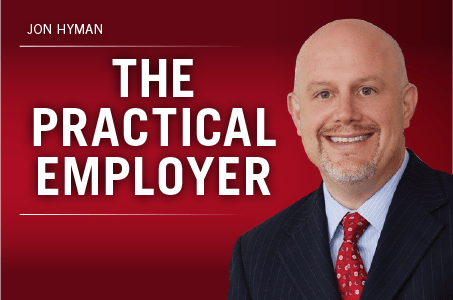When March began this year, nobody had any idea what was just around the corner – a global pandemic, a fiscal meltdown, unprecedented unemployment and a national reckoning with the terrible consequences of centuries of racial violence and inequity. Then we all witnessed a historic decision from the Supreme Court, affirming, at long last, that our family and friends in the LBGTQ community are protected from discrimination in employment under federal law.
In this ever-changing landscape, it is increasingly important to keep up to speed on the latest employment legal cases and developments. Below is a brief summary of the seven most significant employment legal cases.
1. U.S. Supreme Court Issues Landmark Civil Rights Decision
Bostock v. Clayton County, 590 U.S. (2020)
The Supreme Court has issued a landmark decision in Bostock v. Clayton County, holding that Title VII prohibits discrimination against employees based upon sexual orientation and transgender status.
In the 6-3 Opinion of the Court, written by Justice Gorsuch — who, along with Chief Justice Roberts, sided with the four “liberal” members of the Court — the majority held that a “straightforward” rule emerges from the ordinary meaning and application of Title VII’s prohibition against sex discrimination:
“[F]or an employer to discriminate against employees for being homosexual or transgender, the employer must intentionally discriminate against individual men and women in part because of sex. That has always been prohibited by Title VII’s plain terms — and that should be the end of the analysis.’”
Such discrimination has long been a violation of Massachusetts law, Chapter 151B, but with the Bostock decision, it is now clearly unlawful to discriminate in employment on the basis of sexual orientation or gender identity.
2. Unlawful Employment Practices During the COVID-19 Pandemic
During these uncertain times, employers and employees alike are struggling to understand their legal rights and obligations. To that end, there has been a great deal of COVID-specific guidance provided by state and federal agencies, including the U.S. Equal Employment Commission, Massachusetts Commission Against Discrimination, and Office of the Attorney General.
It is important to remember that neither a global pandemic nor an economic recession can be used as a shield by employers to carry out unlawful employment practices.
Indeed, as the Massachusetts Supreme Judicial Court has noted, just because an employer may be required to “reduce its workforce does not mean that it is free to make its employment decisions on impermissible grounds: ‘even during a legitimate reorganization or workforce reduction, an employer may not dismiss employees for unlawful discriminatory reasons.’” See Sullivan v. Liberty Mut. Ins. Co., 444 Mass. 34, 41–42 (2005).
If you think that you may have been illegally targeted, seek legal counsel as soon as possible and prior to waiving any legal rights.
 3. Breach of Contract Damages for the Loss of One’s Life’s Work
3. Breach of Contract Damages for the Loss of One’s Life’s Work
Hlatky v. Steward Health Care System, Inc., 484 Mass. 566 (2020)
Following a jury trial, Dr. Hlatky, an experienced cancer researcher, was awarded $10 million in damages in a breach of contract action against her former employer, Steward Health. The $10 million damage award represented the cost of reestablishing her research laboratory, which she lost as a result of Defendant’s unlawful conduct.
On appeal, the Massachusetts Supreme Judicial Court unanimously agreed the damages awarded were not too speculative, noting that the harm suffered by Dr. Hlatky, including the loss of her research laboratory, equipment, and cell samples, constituted her “life’s work.”
The Court was, however, divided regarding whether restrictions should be imposed on how Dr. Hlatky could use the $10 million award. In the six Justice decision, three Justices were concerned that, since the laboratory had not actually belonged to Dr. Hlatky, an unrestricted award might put Dr. Hlatky in a better position than she would have been had there been no breach, e.g., “[n]othing would prevent Hlatky from spending the $10 million on a house or a yacht rather than on the re-establishment of a cancer research laboratory.”
The other three Justice were not persuaded, “Whether she wishes to start again, whether she even could start again after so much time has passed and her faculty position has been lost, whether she wishes to use the money to fund different research or others; research in the same field, or whether she wants to hike the Appalachian trail — these matters simply are not our concern.”
These Justices pointed out that imposing restrictions on such a damage award would open a “Pandora’s box of unknown future harm to the predictability of contract law upon which contracting parties have relied for hundreds of years.”
As the Court was equally divided, the trial court’s award of monetary damages – without restrictions – was affirmed.
4. Non-Competition Agreements and the “Material Change” Doctrine
Now Bus. Intel., Inc. v. Donahue, C.A. No. 17-3732 (Middlesex Sup Ct. Apr. 1, 2020)
A non-competition agreement may become unenforceable if, after execution, the terms and conditions of employment are modified to the point where the parties have effectively abandoned the original employment agreement and entered into a new employment agreement. This is known as the “material change” doctrine which was delineated in F.A. Bartlett Tree Expert Co. v. Barrington, 353 Mass. 585 (1968). The application of the material change doctrine is a highly fact-specific inquiry and will focus on factors, such as promotions, changes in job duties and titles, changes in remuneration, changes to sales area, as well as the associated time periods for such changes.
In the recent case of Now Bus. Intel. Inc. V. Donahue, the Superior Court rejected an employee’s material change defense to the enforceability of his non-compete. In granting Summary Judgment in favor of the former employer, the Court ultimately held that the temporary and short-term changes to the employee’s job duties, without more, did not amount to a material change sufficient to render otherwise reasonable and valid post-employment restriction unenforceable.
5. Anti-SLAPP Motion Revived
Rosario v. Caring Bees Healthcare, Inc., C.A. No. 19-P-1223 (Mass. App. Ct. June 5, 2020)
Retaliatory lawsuits designed to silence one from speaking out are referred to as strategic lawsuits against public participation, or “SLAPP Suits,” and are expressly forbidden in Massachusetts. See the Anti-SLAPP Statute, M.G.L. c. 231, § 59H (the “Statute”). The Statute provides a quick mechanism to dispose of SLAPP suits, and it allows the victim of a SLAPP suit to recover attorney’s fees.
Here, Ms. Rosario had complained (to co-workers, her mother, the MCAD, and, finally, in court) of sexual harassment by her supervisor, Jean Paul Karangwa. In response, Mr. Karangwa counter-sued Ms. Rosario for defamation and intentional infliction of emotional distress. Relying on the Statute, Ms. Rosario moved to dismiss Mr. Karangwa’s counter-claims. The lower court denied her motion, indicating that there was a colorable basis to believe that Ms. Rosario’s statements were defamatory, i.e., false and causing damage to Mr. Karangwa.
However, the Massachusetts Appeals Court reversed and remanded. The Court reiterated that the legal issue was not solely whether Mr. Karangwa’s claims were “colorable” but also, if so, whether or not they were retaliatory, i.e., “primarily brought to chill [Ms. Rosario’s] legitimate petitioning activities.”
In considering whether or not Mr. Karangwa’s counterclaims were retaliatory, the lower court should consider, among other things, (1) whether the claims are ‘typical’ SLAPP claims, e.g., claims that one would not likely bring on their own, (2) the temporal proximity of when the counter-claims were brought to when Ms. Rosario engaged in escalated protected activity, e.g., when Ms. Rosario filed her claims to court, and (3) the chilling impact on such activity by, for example, increasing the cost to Ms. Rosario of complaining about sexual harassment.
The case was remanded to the lower court for a sequential application of the correct anti-SLAPP standard.
6. Enforcement of Arbitration Agreements
Theodore v. Uber Technologies, Inc., C.A. No. 18-cv-12147 (D. Mass. Mar. 3, 2020)
Many executives (and employees generally) are subject to arbitration clauses of which they are unaware until a dispute arises. The enforceability of such clauses is often hotly disputed. This is particularly true in civil rights cases, pitting two established principles against each other (i.e., the preference for arbitration under federal law against a strong public policy against discrimination). Enforceability is often fact-specific, such as whether the agreement to arbitrate and the waiver of judicial remedy are sufficiently obvious and clear.
Although Theodore is not an employment case, its analysis may be useful, especially regarding on-line forms that invite a user to follow one or more links which can be easily bypassed. The US District Court’s analysis involved not only a review of the text itself but also a discussion of the font size, layout, and background color on the page. The Court went so far as to include screen-shots in the decision.
Ultimately, the Court refused to compel arbitration where Uber invited a customer to click to “CREATE ACCOUNT” without “reasonably communicating” the impact of doing so.
7. The Process – and Not Just the Final Decision – Matters
Comcast Corp. v. Nat’l Assoc. of African American-Owned Media, 140 S.Ct. 1009 (2020)
In Comcast, the Supreme Court of the United States unanimously held that the but-for causation standard applies to claims of racial discrimination raised under 42 U.S.C. § 1981, a statute which guarantees all persons the same right “to make and enforce contracts . . . as is enjoyed by white citizens.” However, the Court expressly declined to decide an issue raised by Comcast, i.e, whether § 1981(a) guarantees only the right to equivalent contractual outcomes, as Comcast argued, or if it also guarantees the right to an equivalent contracting process, as the law has been interpreted for years.
In her concurrence, Justice Ginsburg addressed Comcast’s argument directly:
“I write separately to resist Comcast’s attempt to cabin a ‘sweeping’ law designed to ‘break down all discrimination between black men and white men” … Under Comcast’s view, § 1981 countenances racial discrimination so long as it occurs in advance of the final contract-formation decision. Thus, a lender would not violate § 1981by requiring prospective borrowers to provide one reference letter if they are white and five if they black. Nor would an employer violate § 1981 by reimbursing expenses for white interviewees but requiring black applicants to pay their own way … That view cannot be squared with the statute. An equal ‘right … to make… contracts’ … is an empty promise without equal opportunities to present or receive offers and negotiate over terms … It is implausible that a law ‘intended to secure … practical freedom’ … would condone discriminatory barriers to contract formation.”
As Justice Ginsburg recognized, and recent events have made abundantly clear, we must remain vigilant to protect and expand, not erode, our civil rights laws.




